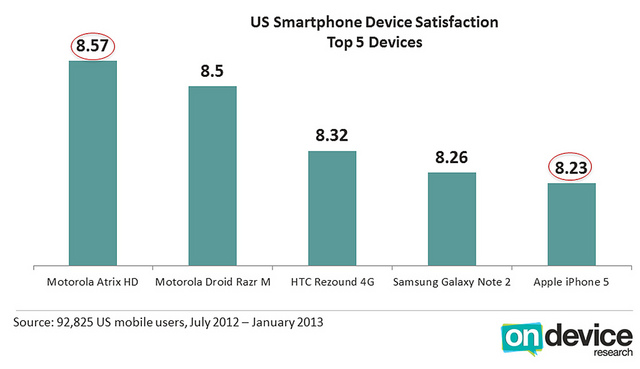
The “5” in iPhone 5 stands for more than just the fifth generation of iPhone. It also stands for fifth in customer satisfaction, which is where Apple’s handset placed in a recent report from OnDevice Research.
In a poll of over 320,000 smartphone and tablet users across six countries – 93,825 in the United States – OnDevice Research found Android handsets to be the champions of the major mobile markets. In the United States, four different Android handsets finished ahead of Apple’s iPhone 5. Despite scoring an 8.23 in user satisfaction, the iPhone 5 is stuck looking up at Samsung’s Galaxy Note 2 (8.26 user satisfaction score), the HTC Rezound (8.32), and Motorola’s Droid Razr M (8.5) and Atrix HD (8.57). The Atrix HD snagged the top spot in satisfaction while also being the only real budget-sensitive offering on the list. Perhaps the lowered expectations of the less expensive handset gave it a boost by boasting surprisingly good results for owners.
Across the pond, Apple fared a bit better. The iPhone 5 had a satisfaction score of 8.21 in the U.K., finishing second only to HTC’s One X and it’s 8.47 score. The top five for the UK was rounded out with an all Samsung line up of the Galaxy Note 2, Galaxy S 3 Mini, and Galaxy S 3.
The silver lining for Apple should be that if one combines the full rankings – which includes data from the U.S., U.K., France, Germany, Japan, and Indonesia – and looks at overall device satisfaction, the Cupertino company is still the cream of the crop. As a company, Apple finished first across the entire survey, followed by Google even though Google doesn’t actually make any devices itself. Finishing last in overall device satisfaction is Samsung, though no reasoning or data is given to explain why.
Editors' Recommendations
- Google is making it easier to ditch your iPhone for an Android phone
- Hurry! Get the latest iPhone SE for $149 in Walmart’s Memorial Day sale
- 5 phones you should buy instead of the iPhone 15 Plus
- 5 phones you should buy instead of the iPhone 15
- How to find your lost phone (tips for iPhone and Android)


